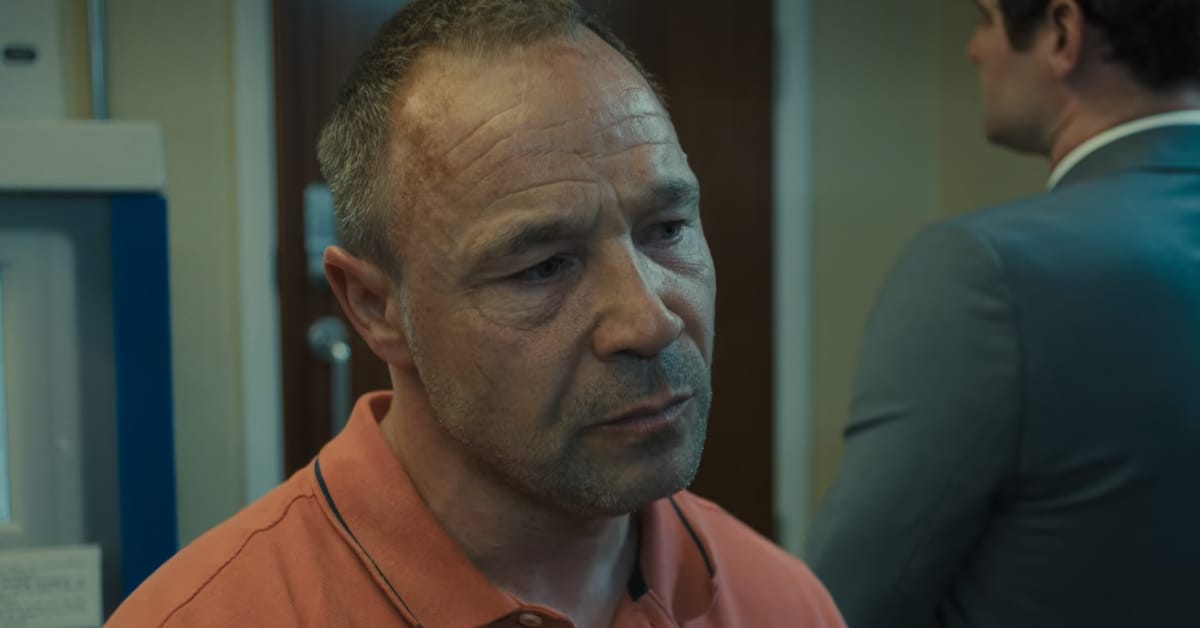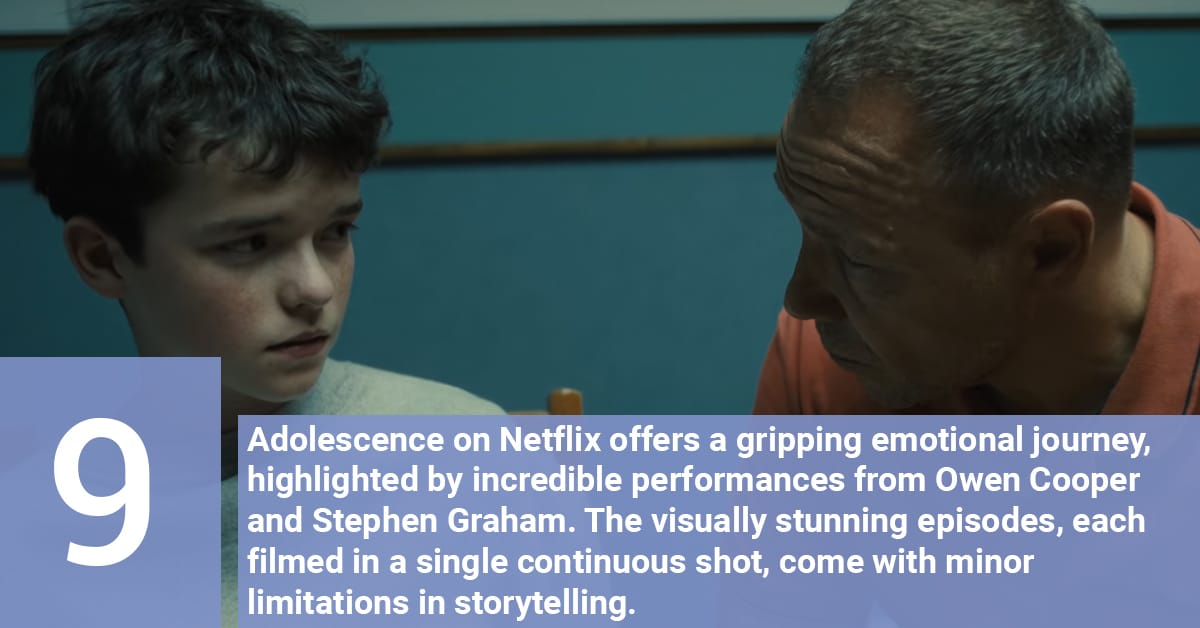The same principle applies to everything in life: your expectations beforehand shape how you ultimately reflect on the experience. The British miniseries Adolescence, recently released on Netflix, is no exception.
If you dive in expecting a classic, detective-style whodunnit to binge through, you might come away feeling that there are some loose ends. But if you approach the series with the intention of exploring the emotional impact on the loved ones of a young murder suspect—and the psychological complexities involved— then you’re likely to find yourself deeply moved by the time the credits roll.
I’ll do my best to keep this review spoiler-free, though for several reasons, that won’t be easy. Bear with me.
One Continuous Shot Per Episode is a Technical Masterpiece

Adolescence wastes no time throwing you into the story, opening with a police raid as a tactical team storms into the Miller family’s home to arrest 13-year-old Jamie on suspicion of murdering a young girl. The sheer chaos, devastation, and raw emotion of the moment are instantly and convincingly brought to life by the entire cast.
One of the most fascinating aspects of Adolescence is that every episode is filmed in a single continuous shot. There are no cuts, meaning everything unfolds in real-time. The only time jumps occur between episodes, but within each episode, events play out seamlessly. For example, the first episode captures the arrest and everything that happens immediately afterward.
This approach doesn’t just provide a gripping, hour-by-hour look at the aftermath—covering aspects like paperwork, legal proceedings, and initial interrogations—but also offers an incredibly intimate perspective on every emotion, every facial expression, and the growing sense of despair in the minds of the suspect, his parents, and his 15-year-old sister.
“I’ve always been a fan of long, uninterrupted scenes, but I had never seen entire episodes filmed this way. It’s an incredible achievement that adds to the series’ intensity and realism.”
The sheer brilliance of these one-shot episodes had me hooked. Crafting a script that flows naturally within this format, while ensuring that every single line of dialogue remains engaging, is an extraordinary achievement. And that’s without even mentioning how technically impressive it all is.
Instead of using traditional cuts to shift focus between characters, Adolescence cleverly transitions by having different people pass through the frame, seamlessly shifting the perspective to follow them instead. I’ve always been a fan of long, uninterrupted scenes, but I had never seen entire episodes filmed this way. It’s an incredible achievement that adds to the series’ intensity and realism.
Of course, this approach also comes with drawbacks and less flexibility. For instance, if an episode starts in a specific location, you already know that you won’t see anything happening with characters in other places. There were times when I was curious about developments elsewhere, only to realize they wouldn’t be shown in that episode.
Fortunately, that small disappointment never lasted long. The writers always manage to introduce gripping and emotionally powerful moments that quickly make you forget about it.
The Acting in Adolescence Is Phenomenal, Especially From Newcomer Owen Cooper

Going back to my earlier point about wanting to spend more time with certain characters, this was mainly due to the incredibly strong performances of Owen Cooper, who plays the accused Jamie, and his father, played by Stephen Graham. And whenever they shared the screen, they absolutely blew me away.
But let’s start with Owen Cooper, who, unbelievably, is a complete newcomer. How is that even possible?!
At 15 years old in real life (rather than 13 like his character), Adolescence was Cooper’s very first on-set experience. And what an experience it was. He had to handle endless takes with no cuts to fall back on. That’s a huge amount of pressure for a debut performance. Imagine making it all the way to the final minute of a scene, only to mess up? I already used to be stressed just giving a school presentation. But if Cooper felt any stress, you’d never know it. And as for inexperience? There’s no trace of that either.
Over the course of four episodes, the boy goes through a rollercoaster of emotions. What is most impressive is how effortlessly he transitions between them.
Episode 3 is the perfect example. We see him battling himself, society, the struggles of modern teenagers and technology, and his psychologist (also incredibly well played by Erin Doherty). One moment, he’s just an innocent kid, and the next, he explodes in rage, trying to assert dominance over his psychologist. And it wasn’t just him going through those emotions; I was right there with him. One second, I felt sorry for him; the next, I thought; what an annoying little shit.
Nothing but praise for Owen Cooper, who without a doubt has a huge future ahead of him.
Stephen Graham Also Delivers a World-Class Performance

His on-screen father, Stephen Graham, is a far more familiar face. Personally, I knew him best for his gangster roles. He starred in films like Snatch and The Irishman and appeared in series such as Peaky Blinders and Boardwalk Empire. I mostly remembered him as a fiery, short-tempered guy with a big mouth. In Adolescence, that side of him is still very much present, but this time, he brings a depth of raw emotion that I hadn’t seen from him before.
The sheer helplessness a parent must feel when their child is suddenly arrested for murder is beyond my imagination. But for Graham, it seems effortless. He brings it to the surface so naturally and convincingly that it’s almost unsettling.
One of the most powerful scenes in the first episode lingers on his devastated face for nearly two minutes. There’s no dialogue, yet his expression says more than any script ever could. I sat there, just as powerless, completely drawn in by Graham’s performance and the brilliant writing behind it. And that’s just a glimpse of what he’s capable of.
It’s not easy for media to bring me to tears (though, admittedly, it seems to get easier with age), but Graham came dangerously close—both in the first episode and again in the finale. Then again, both times, a speck of dust just happened to fly into my eye. Because, of course, I’m far too masculine to cry… right?
Andrew Tate, Toxic Masculinity, and the Invisible Dangers of Our Time

I (unfortunately) know the name Andrew Tate but I admit I don’t know much more than some basic facts. Besides those, I’ve never bothered to keep up with his antics, nor do I have any desire to waste my time Googling him. Every minute you spend listening to him probably kills off another brain cell.
What I do know is that he’s bald, a controversial social media figure, misogynistic, and a self-proclaimed hyper-masculine alpha male. Thanks to Adolescence, I also learned a few more disturbing details about this blight on society.
One of the show’s key themes is the danger of social media, particularly for younger audiences. As a parent, you can’t possibly monitor what your child is looking at 24/7, or what kind of harmful influences are seeping into their still-developing brain. And as someone who hopes to have kids one day, that’s a terrifying thought.
Social media has brought a lot of positives, but unfortunately, it has also given a platform to people who should never have had one in the first place. And we haven’t even begun to see the full impact of that.
“Social media has brought a lot of positives, but unfortunately, it has also given a platform to people who should never have had one in the first place.”
Idiots like Tate can poison millions of vulnerable teenagers through nothing more than a phone screen, infecting them with delusions about the world. Ideas like women should be submissive to men, women are a man’s property, emotional vulnerability is a sign of weakness, and so on.
For insecure teenagers struggling with their identity, searching for belonging, or simply trying to figure out their place in the world, social media makes it frighteningly easy to be bombarded with the wrong role models. It’s nothing short of brainwashing, with all the dangerous consequences that come with it.
So when your son is suddenly suspected of murdering a young girl, it’s only natural to question yourself as a parent. Did I do something wrong? Did I fail him somehow? Should I have asked more questions about what he was doing alone in his room? What was he watching on his computer? What was he looking at on his phone? Should I have respected his privacy less? Trusted him less?
I fear that, no matter what, you’d never be able to absolve yourself of guilt. It would always feel like you failed, even when some things are simply out of our control. As terrifying as that is to accept.
Conclusion

Adolescence is a must-see, thanks to its stellar acting, powerful script, and strong technical achievements.
The themes explored in the series are very relevant, forcing you to reflect on the effects that social media and peer pressure can—and will—have, many of which we may not even fully comprehend yet.
Every actor and actress delivers an outstanding performance, but it’s the 15-year-old Owen Cooper and the seasoned Stephen Graham whose performances will stay with me for a long time. The way they bring their emotional rollercoasters to life is painfully convincing.
The episodes, each filmed in a single continuous shot, are visually stunning, and the lack of cuts makes it feel less like television and more like real life. However, this also comes with some limitations, as each episode is almost entirely confined to the location where it starts. Partly because of this (and undoubtedly due to conscious choices made by the writers) some issues remain unresolved.







